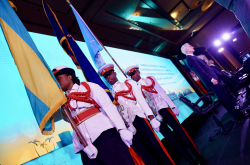LYON, France – A counter-terrorism operation coordinated by INTERPOL with the support of AFRIPOL has enabled frontline police across Central and Eastern Africa to arrest 14 terror suspects and seize explosives.
The month-long (27 March – 23 April) operation, codenamed Tripartite Spider, was organized to support the ability of national Counter-Terrorism (CT) investigation teams to identify suspected terrorists and disrupt the financial networks behind them.
It was undertaken in the Democratic Republic of Congo (DRC), Kenya, Somalia, Tanzania and Uganda.
The operation involved police, customs, border forces and counter-terrorism experts, including INTERPOL’s Regional Counter-Terrorism Node in Africa.
Underlining the need for a pan-African, multi-stakeholder effort against terrorism, the 14 suspects arrested during the operation were linked to terror groups ADF, Al-Shabaab and ISIS, which pose a growing threat across Africa.
Leads and objectives generated during Tripartite Spider are being followed up by participating countries beyond this operation with investigative and analytical support provided by INTERPOL’s Counter-Terrorism directorate.
Among the arrests two individuals were intercepted as suspected members of Al-Shabaab, while another was arrested for his alleged links with the 2022 Oicha (DRC) deadly suicide bomb attack attributed to ADF. Another suspect was held for terrorism financing through a huge money transaction scheme disguised as a flowers business, with alleged links to an ISIS suspect tied to the 2017 attack on the International Village Hotel in Bosaso, Somalia.
Another four individuals were arrested for suspected links to ISIS activities in Southern Africa while another individual was reportedly found in possession of a significant quantity of explosives, including 12 cartons of explogel – 25kg per carton, 24 reels of 250m of detonating cord and 400 pieces of electronic detonators.
Using INTERPOL’s global criminal databases for wanted people, stolen travel and identity documents, and stolen vehicles, law enforcement in the participating countries worked together with INTERPOL and AFRIPOL to locate, intercept and stop criminals trying to cross borders.
The use of INTERPOL Notices to identify the suspects as well as INTERPOL’s Counter-Terrorism Crime Analysis File (CT CAF) to obtain analytical input helped underpin the operation, with INTERPOL’s Counter-Terrorism directorate facilitating information sharing and intelligence analysis.
With INTERPOL, AFRIPOL and the African Union working side by side and developing combined responses to Africa’s policing needs, Operation Tripartite Spider was undertaken under the framework of INTERPOL’s Support Programme for the African Union in relation to AFRIPOL (ISPA).
The ISPA Programme supports AFRIPOL in strengthening its position as the lead institution in Africa for preventing and combating transnational organized crime, terrorism and cybercrime.
Related news

260 suspected scammers arrested in pan-African cybercrime operation
26 September 2025











